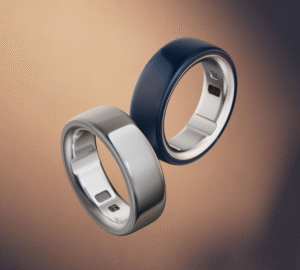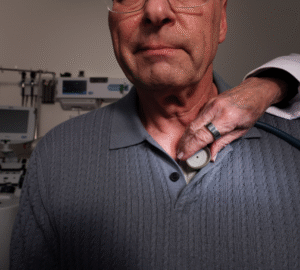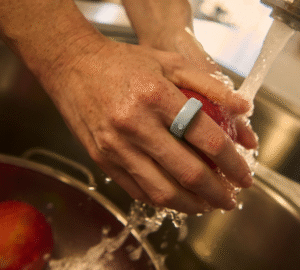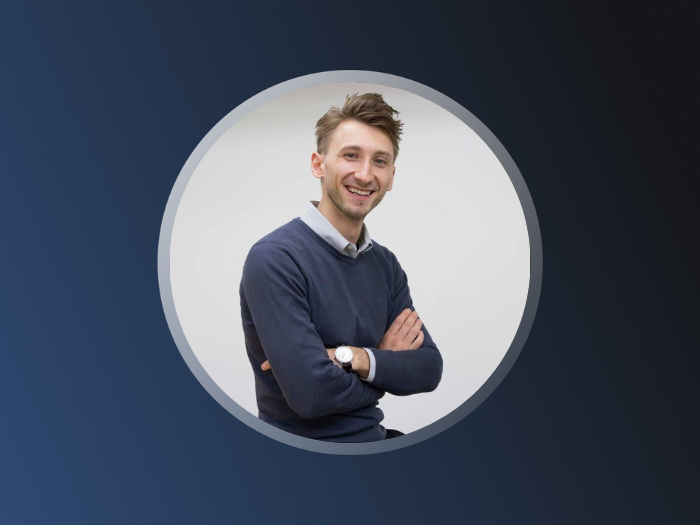Who: Misha Y., Tokyo, Japan
According to a 2020 survey, 75% of workers have experienced burnout at their jobs, and many cite it as the main reason for leaving their jobs. Tokyo-based entrepreneur Misha spoke with Oura about his burnout experience, and how Oura helped him identify his stressors, slow down, and ultimately make the best career choice for his well-being.
How did you hear about Oura?
I was listening to an episode of Dave Asprey’s Bulletproof Radio podcast and he mentioned that Oura was one of his favorite wearables. He was talking about heart rate variability (HRV) during sleep and how he used this to gauge his stress-levels. I found this fascinating, particularly as I was going through a stressful period growing my startup and needed to take control of my situation.
Tell us about your burnout experience.
As an entrepreneur building a business, I was fueled by the desire to build a solid business case and secure funding. As a result, I pushed myself to the limit and ignored my personal well-being.
I began to overeat, gorging on sugary snacks and overstimulating with caffeine. Late-night calls with teams in different time zones left me irritable and frustrated. I began to get scary symptoms like headaches and heart palpitations. Eventually, I hit my limit and had a total breakdown. I wasn’t able to work for several weeks and put my business on pause. This was a very dark period in my life. A quote comes to mind: “What’s wealth, without health?”
Fortunately, with rest, better nutrition, therapy, and support from family and friends, I was able to recover. However, I knew that without making real changes, burnout could easily become a recurring issue. I became more focused on my mental, physical, and emotional health and was determined to prevent burnout from happening again.
How has Oura supported you as you recovered from burnout?
After my first burnout episode, we continued to raise money and built a small, fully-remote team. Unfortunately, we weren’t really delivering on what we set out to do. The pressure from investors was building. I had already experienced burnout once and was afraid that it would happen again.
When I looked at my Oura App, I knew something was wrong — and now I could quantify it. My HRV was low and I was getting less sleep. So I started using the guided meditations in the Explore content on the Oura App before work and in between meetings. I noticed an increase in calmness and my heart rate would drop a few beats.
RELATED: Try Oura’s Guided Sleep Meditations for Deep and Restful Sleep
I’d been meditating for a while but had fallen off the bandwagon recently. This led me to decide to go on a longer meditation retreat, so I packed my bags for Bali and went off for a ten-day retreat. During those ten days, my Oura stats were off the charts and I felt incredible. In fact, my HRV almost doubled! High HRV is associated with better emotional regulation and lower levels of stress, so I took this as a good sign.
RELATED: At 66, This Oura Member Doubled His HRV and Improved His Health — Here’s How
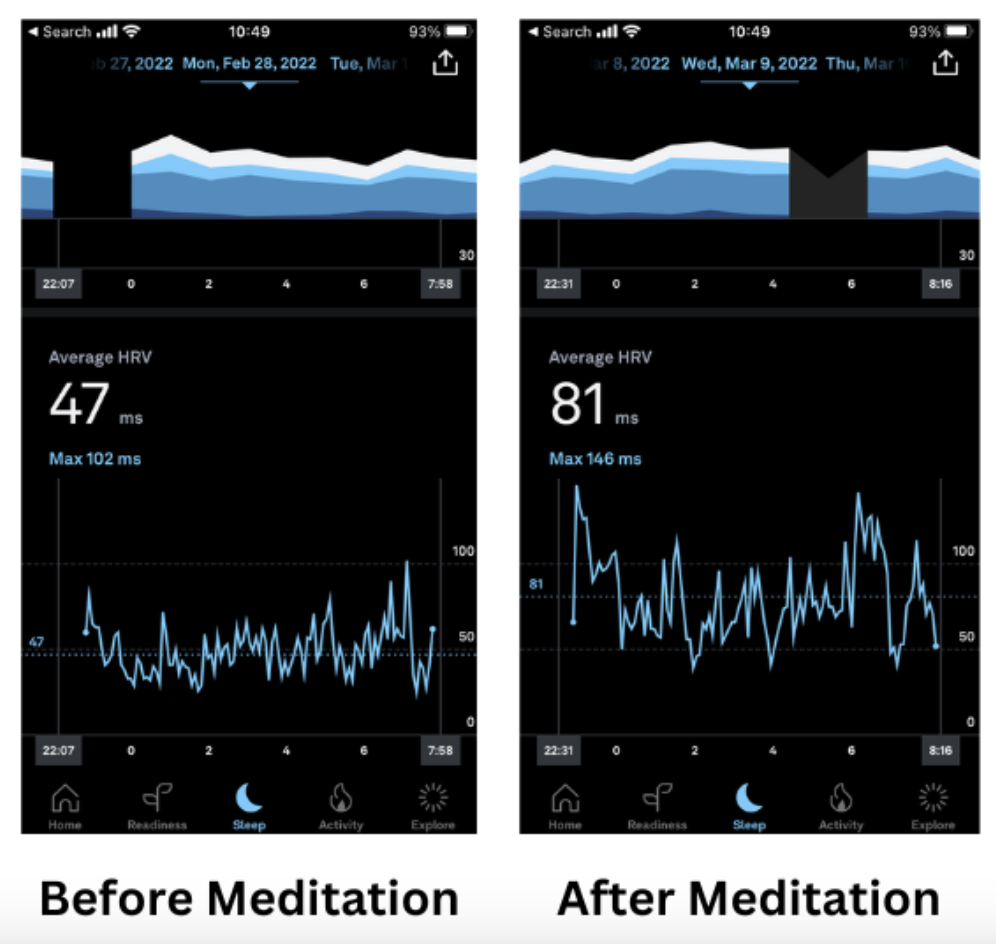
What’s more: While I was technically getting five or six hours of sleep on the retreat (on account of waking up early to meditate every day), my Oura Ring thought I was getting more deep sleep and REM sleep than previously!
Apparently deep meditative states can look similar to REM sleep, and there’s some evidence that shows meditation can “replace” sleep. Whether or not my meditation really replaced sleep is up for debate, but I certainly felt energized and awake.
Here’s what my REM sleep stats looked like:
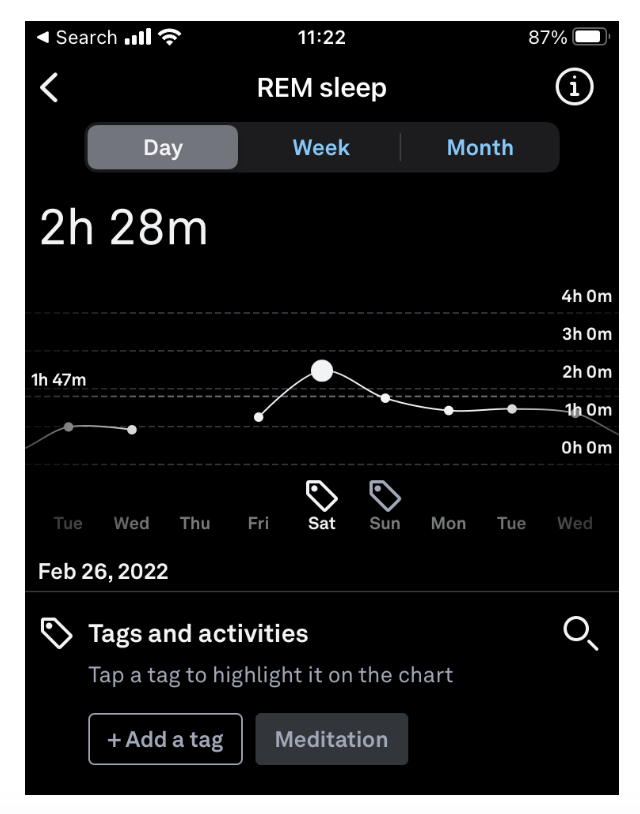
Long story short: During that meditation retreat, I had a few personal breakthroughs. I decided that working on my business was no longer worth the emotional and physical stress. I knew I had been putting off the inevitable and made the difficult decision to sell my business and move on. And I’m very glad I did!
What are the most surprising things you’ve learned about your health since using Oura?
When I look at my Oura data, it serves as positive reinforcement to continue activities that I previously suspected were beneficial for me. For example, beyond confirming that meditation clearly rests my body and mind (and nudging me to meditate more), here are two healthy habits that I was encouraged to continue thanks to Oura data:
- Barefoot walking: After just a couple of hours hiking barefoot in the mountains, the next day’s HRV is higher and my resting heart rate is lower. There seems to be a greater impact for me compared to hiking with shoes on. Nowadays I make sure to take my shoes off at the park or during a hike, even if it’s just for a few minutes.
- Cold showers and ice baths: Even two or three minutes of cold immersion per day has a noticeable impact on my resting heart rate. Some studies have found specifically that applying cold on your neck was enough to trigger a vagal response, which reduces anxiety and lowers heart rate. So, when I take a cold bath or shower, I always submerge my neck!
READ MORE: How To Increase Your HRV (Heart Rate Variability)
What’s your advice for other entrepreneurs or anyone suffering from burnout in the Oura community?
Hustle culture is pervasive nowadays. The media glorifies the hard-working entrepreneur that sacrifices it all. But I’ve learned that this really isn’t sustainable. You only have one body and one mind, and you have to take care of it.
In my journey, I was searching for happiness by constantly striving for external achievements. But I learned that true and long-lasting well-being comes from within. We have to prioritize our health, mind, and relationships to lead a fulfilling life.
I would encourage everyone to take a good, hard look at their Oura data. Is this the life you want to be living? If not, it’s time to make some changes. The data doesn’t lie.
What’s Your Oura Story?
Everyone’s story is unique, and we’d love to hear yours. Share your story here.







